Growing Hope
go.ncsu.edu/readext?860560
en Español / em Português
El inglés es el idioma de control de esta página. En la medida en que haya algún conflicto entre la traducción al inglés y la traducción, el inglés prevalece.
Al hacer clic en el enlace de traducción se activa un servicio de traducción gratuito para convertir la página al español. Al igual que con cualquier traducción por Internet, la conversión no es sensible al contexto y puede que no traduzca el texto en su significado original. NC State Extension no garantiza la exactitud del texto traducido. Por favor, tenga en cuenta que algunas aplicaciones y/o servicios pueden no funcionar como se espera cuando se traducen.
Português
Inglês é o idioma de controle desta página. Na medida que haja algum conflito entre o texto original em Inglês e a tradução, o Inglês prevalece.
Ao clicar no link de tradução, um serviço gratuito de tradução será ativado para converter a página para o Português. Como em qualquer tradução pela internet, a conversão não é sensivel ao contexto e pode não ocorrer a tradução para o significado orginal. O serviço de Extensão da Carolina do Norte (NC State Extension) não garante a exatidão do texto traduzido. Por favor, observe que algumas funções ou serviços podem não funcionar como esperado após a tradução.
English
English is the controlling language of this page. To the extent there is any conflict between the English text and the translation, English controls.
Clicking on the translation link activates a free translation service to convert the page to Spanish. As with any Internet translation, the conversion is not context-sensitive and may not translate the text to its original meaning. NC State Extension does not guarantee the accuracy of the translated text. Please note that some applications and/or services may not function as expected when translated.
Collapse ▲NC State Extension Master Gardener℠ program volunteers cultivate gardening knowledge across the state
The Healing Transitions facility in south Raleigh, about three miles from the NC State main campus, provides a lifeline for men who have hit rock bottom. They have fallen prey to their addictions. For many, it cost them everything — family, friends, jobs.
They have a chance to not just detox, but to learn coping skills. When they complete the program -– the average stay is 14 months — they will have the tools to remain drug or alcohol free, and have a chance to succeed.
Addiction can feel like a prison, but the facility is far from austere. There’s a courtyard behind the building with flowering vines and a dozen or so vegetable beds. A few steps away is a memorial garden with a fountain, a few perennial flowers, and annuals that will bloom in a riot of colors in late spring.
The vegetables and flowers are planned, planted and tended with the assistance of NC State Extension Master Gardener volunteers.
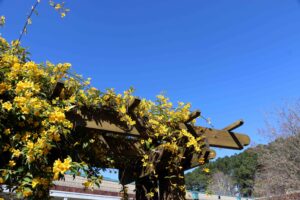 “They have created an environment of joy and peace and hope,” said Windi White, Healing Transitions director of development. “So many of our participants haven’t been able to be in an environment of beauty. How thankful we are for the collaboration with the Master Gardener volunteers; the service that they provide here is just so valuable. To be able to work alongside them, and live and work in an environment of beauty in such tragic circumstances is a true blessing. We really value what they do here.”
“They have created an environment of joy and peace and hope,” said Windi White, Healing Transitions director of development. “So many of our participants haven’t been able to be in an environment of beauty. How thankful we are for the collaboration with the Master Gardener volunteers; the service that they provide here is just so valuable. To be able to work alongside them, and live and work in an environment of beauty in such tragic circumstances is a true blessing. We really value what they do here.”
NC State Extension Master Gardener℠ (EMG) is a statewide program operating in 83 of Extension’s 101 centers. EMG provides science-based horticultural knowledge that helps North Carolinians cultivate healthy plants, landscapes, ecosystems and communities. The program includes more than 3,800 volunteers statewide.
“They respond to emails and phone calls, and requests for help from school and community gardens,” said Jeana Myers, Extension agent for agriculture and horticulture and supervisor of the Master Gardener volunteers in Wake County. “They have a speakers bureau, and represent Extension at events — Earth Day, school days. They have a booth at the State Fair, teach about composting … I could go on! They take on a lot of responsibilities. It’s a lot of work, and they do this all as volunteers. I have a team for about everything. They are just amazing.”
Under the guidance and direction of Extension agents, aspiring Master Gardener volunteers must undergo a 40-hour training program, pass an examination, and complete at least a 40-hour internship. To remain active, they must put in a minimum of 20 hours of volunteer service and 10 hours of continuing education each year.
Extension Master Gardener is a nationwide initiative, with local programs and training typically administered through a state land-grant university and its Cooperative Extension unit. It began in Washington in 1973, and came to Wake County in 1979. The program remains robust in Wake, with 147 active Master Gardener volunteers and another 34 in training.
“That is where the Extension Master Gardener program started in North Carolina and they have a very strong group of dedicated volunteers supporting a wide range of educational outreach efforts including therapeutic horticulture, gardening programs for the public, a garden info line, and booths at events where volunteers answer questions and provide gardening advice, demonstration gardens, and more,” said Charlotte Glen, statewide coordinator.
Master Gardener volunteers come from different backgrounds, but they all have one thing in common — a love of plants, and a desire to help people succeed in their gardens and lawns.
“Their motivation is to learn more about horticulture. And to volunteer,” said Claire Miller, who heads the mentoring program in Wake County. “We make it pretty clear if you just want to learn the info, the manual is online. But if you want to be a volunteer and help homeowners learn best practices for their lawn and for growing, this is for you. ”
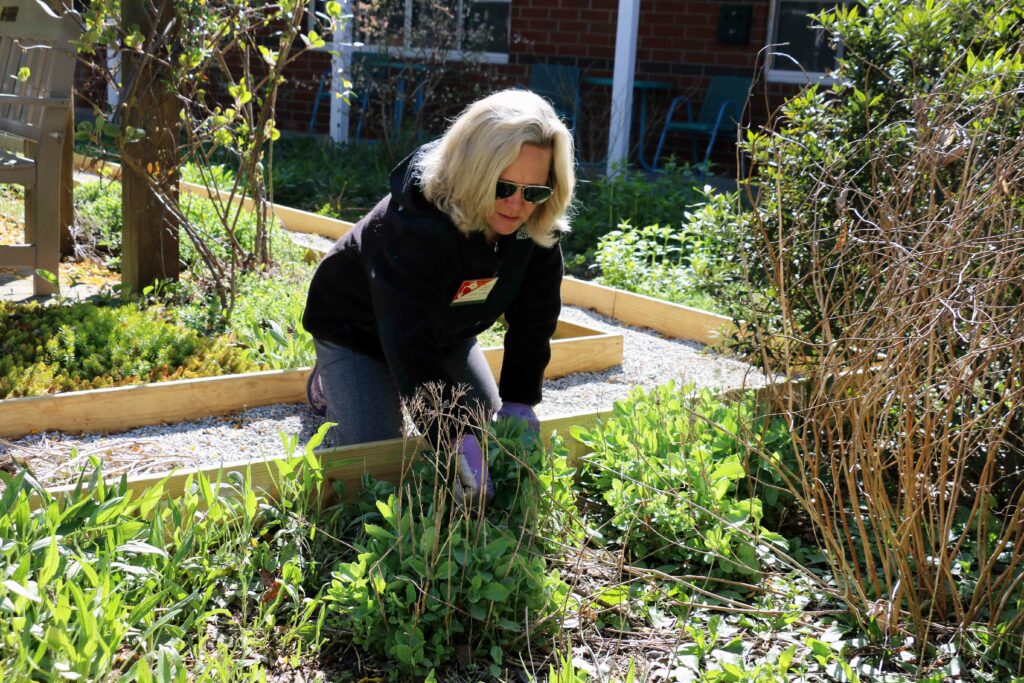
Master Gardener volunteer Cris Clemons weeds a vegetable bed at Healing Transitions in Raleigh.
Miller has been a Master Gardener volunteer for “about 30 years.” A lot has changed in the last three decades, but there remains a common thread in the advice sought.
“It’s usually something ailing, a plant not doing well,” Miller said. “What can I spray on it to make it come back to life? It’s usually more complicated than that. Soil testing is popular. Sometimes it’s, ‘What can I plant here? Someone built a house next to my property line. What can I plant to screen it? I bought a new house, why won’t anything grow?’”
In some counties, Master Gardener volunteers spend a portion of their volunteer hours directly answering questions from the public via phone calls, emails or walk-ins at their Extension center. It’s particularly important in early spring when it is planting season across North Carolina.
They are exposed to other opportunities during their internships, and after certification can choose where else to serve.
“We want them to try at least three different areas during their internship just to see what they are like and what they might like to do,” Miller said.
The Master Gardener volunteers who help at Healing Transitions are part of the therapeutic horticulture team.
“I like the notion of partnering with and working with folks who made that decision to enter recovery,” Allison Northcutt said. “If anybody’s a gardener, they know that digging in the dirt is very therapeutic. My hope in working with these folks is that they will find some joy, solace and encouragement on their journey in recovery.”
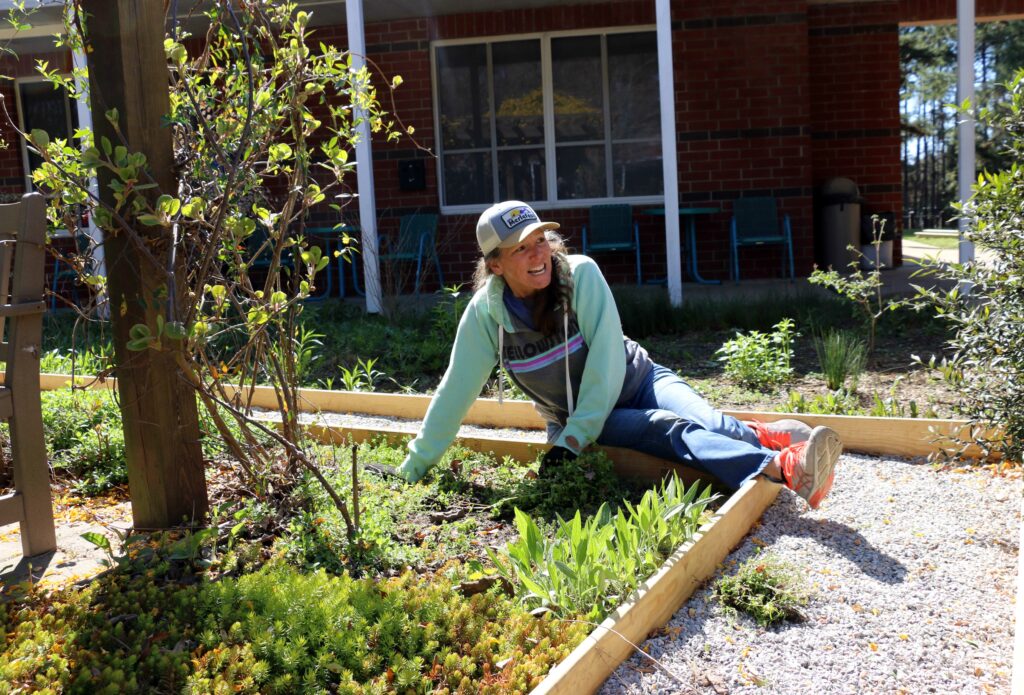
Master Gardener volunteer Betsy Hamilton works at Healing Transitions.
A half-dozen or so volunteers, under the leadership of Cris Clemons, Chris Wagner and Northcutt, come here every week to work in the beds and to advise Healing Transitions participants on how to care for the plants during the week.
“We come once a week for an hour, and these guys do everything,” Clemons said. “We show them what to do, and they do it. They take it so seriously and do it so well. Gardening is therapeutic.”
Clemons, who also serves at the Healing Transitions women’s facility in Raleigh, became a Master Gardener volunteer in 2008 and sports a coveted 1000 Hour badge. She’s been coming to Healing Transitions since 2014, when Extension took over caring for the gardens originally planted by the Raleigh Realtors Association.
“I got involved because my brother-in-law is an addict,” she said. “We had tried and tried and tried to help him. He’s in recovery now, thank God. It was a way to feel like I was doing something when we were pretty helpless with him.”
Clemons and Wagner oversee the vegetable beds. They work with Healing Transitions staff and participants on what to grow, organize planting days in spring and summer, and help with decisions on when to harvest.
“We get about 1,500 pounds of food out of here and it goes straight into the kitchen,” Clemons said. “It’s mostly a salad bar garden. We grow a ton of tomatoes in the summer, and peppers. We grow what they want. There’s no sense to grow eggplant if they don’t want it. We tried kale, and they were like can you grow collards? Yes we can. They are getting fresh organic produce that they’ve grown. It’s kind of a drop in the bucket for how many guys are here. But it’s exciting. They grew them. It’s literally farm to table.”
Northcutt, who began volunteering at Healing Transitions in 2018, primarily has responsibility for the flower beds at the memorial garden.
“When I came on board that garden had been landscaped, but it had been neglected and there were hardly any plants in it,” she said. “We took on the added responsibility of bringing that back to life.”
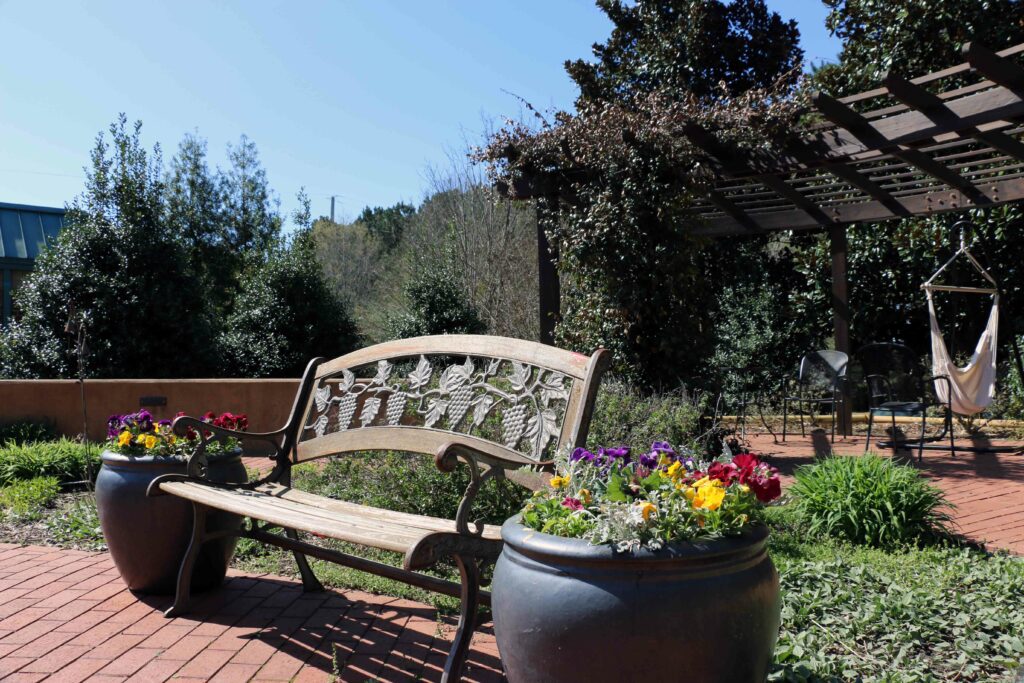
The memorial garden is a place of beauty and peace.
It is now a space that embodies the themes of beauty and hope. In the summer, buildings throughout the campus are adorned with flowers cut from the garden. Throughout the year, it is a peaceful place where participants can relax, meditate, or have difficult conversations with family and friends.
“We hear so many stories of people reconciling with loved ones up there,” Clemons said.
The Master Gardener volunteers work with the Scarecrow, the Healing Transitions participant assigned to oversee the gardens. Ricky Roberts rotated into the position in March.
“I really enjoy it. It’s very therapeutic and relaxing,” he said. “This place gets very chaotic, so coming out here this is like heaven.”
In his short time as the Scarecrow, Roberts already had learned a lot from the Master Gardener volunteers.
“They are awesome,” he said. “They bring a lot of knowledge about plants. When to plant, when to weed, how they grow, how much water they need, placement next to other plants. I’m from New York City. I don’t know how to garden. We had a couple of trees on the block. That was it.”
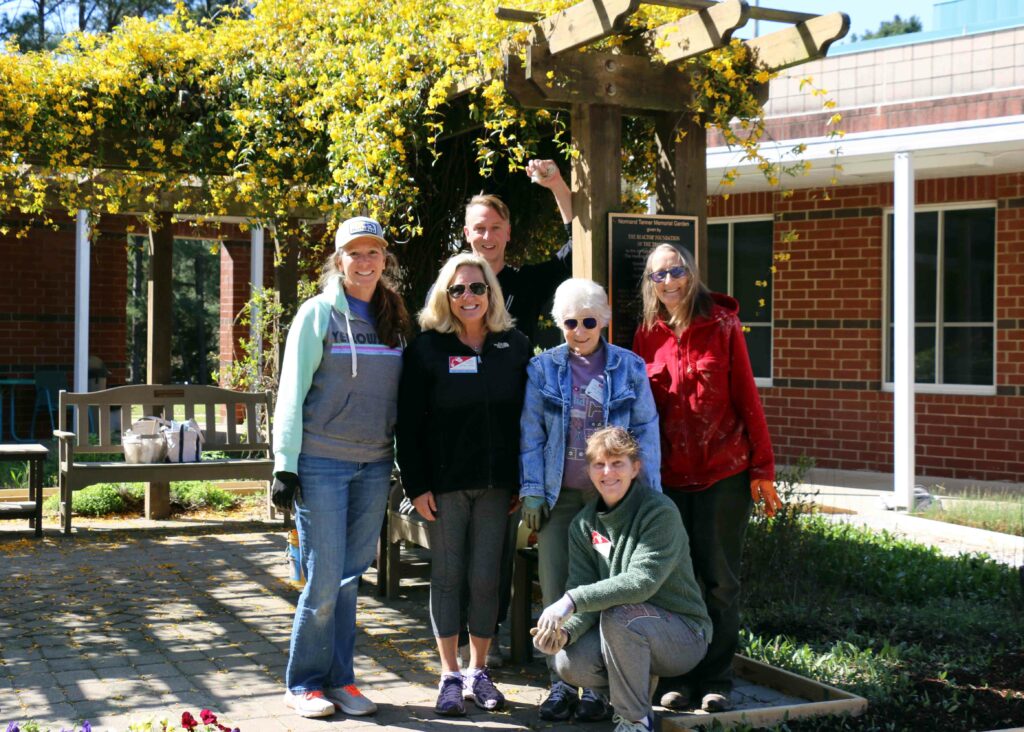
A team of Master Gardener volunteers with the “Scarecrow” at Healing Transitions. From left: Betsy Hamilton, Cris Clemons, Ricky Roberts, Judith Thompson, Allison Northcutt (squatting) and Prudence Swartwood.
About five miles from Healing Transitions, another group of Master Gardener volunteers are passing on their love of horticulture through a program called Garden Corps, a partnership between Extension, the Food Bank of Central & Eastern North Carolina, and the City of Raleigh Parks and Recreation that brings teens and older adults together to grow and garden.
Youth in grades 6-12 who express interest through Parks and Rec are partnered with an adult mentor. For 12 weeks, they gather at the Food Bank on Capital Boulevard near downtown Raleigh, which provides meeting and garden space. A team of Master Gardener volunteers led by Leslie Cohen and Mitzie Barnette provides the horticulture know-how.
The program covers everything from seed to plate. Participants receive classroom instruction on topics including growing cycles and how to prepare the perfect soil, plant and harvest in the teaching garden, and get nutrition information and cooking lessons in the on-site kitchen.
“They go through all areas of learning to garden, from planning a garden, to proper soil, seeding and transplants,” said Cohen, a Master Gardener volunteer since 2016. “They learn about pest management and disease management. They learn about composting. They grow their own microgreens, grow their own herb garden, and grow their own vegetables plants to take home and manage themselves. They learn about harvesting and pollinators. They can leave here not only knowing how to grow their own food, but to inspire and teach others how to grow their own food. It helps with the food insecurity approach.”
The program meshes perfectly with the Food Bank’s mission. It emphasizes the importance of healthy, organic food, provides practical instruction, and even helps stock the shelves.
“We really wanted community groups to utilize the garden,” said Sara Clement, nutrition educator manager. “We wanted the focus to be educational gardens. We really want to teach all those aspects, from seeding all the way through harvesting. The food we harvest comes into the Food Bank and we hand it out to the community, to those in need. We cover 34 counties. In our 34 counties we have over 588,000 individuals who are food insecure. We really try to break people from that cycle. We empower them and give them the tools they need to get back on their feet and get healthy meals to their family.”
Giving people of all ages the tools to succeed in any horticultural goal is ample motivation for any Master Gardener volunteer.
“It’s so fun to work with the kids and the adult mentors and the Extension Master Gardener team,” Barnette said. “They come in and they’re sort of like, ‘My mom made me come.’ By the end of the class they are so excited. They really become more enthused and involved.”
Visit the NC State Extension Master Gardener site to learn more about the program and to find your local program.

